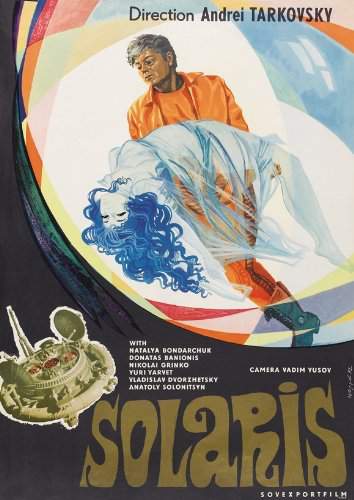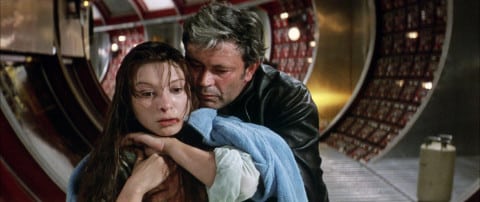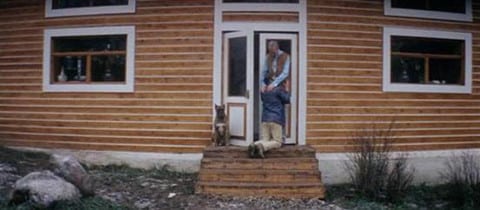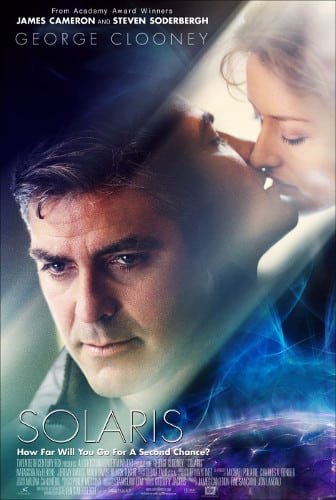Solaris (1972)
Directed by: Andrei Tarkovsky
Written by: Andrei Tarkovsky, Fridrikh Gorenshtein
Starring: Donatas Banionis, Jüri Järvet, Natalya Bondarchuk, Vladislav Dvorzhetsky
Soviet Union
AVAILABLE ON BLU-RAY AND DVD
RUNNING TIME: 176 min
REVIEWED BY: Dr Lenera, Official HCF Critic
SPOILERS!
Psychologist Kris Kelvin embarks on a journey to a space station orbiting the remote oceanic planet Solaris. After decades of study, the scientific mission at the space station hasn’t progressed, with the crew sending confusing messages that appear to be gibberish, while former space pilot Henri Berton claims he saw a four-meter-tall child on the ocean surface of the planet. Kelvin is sent to evaluate the ship as it orbits the planet and determine whether the venture should continue. There, he finds that one of the three scientists has killed himself and the other two are uncooperative and evasive, though they do mention “guests”, and Kelvin begins to catch fleeting glimpses others aboard the station. Then he finds his wife Hari, who committed suicide, in his cabin….
Regarded by many as the greatest science fiction film to come out of Russia and by some as one of the best films of its genre ever, Solaris is a movie that took me three attempts to actually get through. I first had a go at it about twenty years ago, found it absurdly ponderous [I mean there’s slow – and then there’s really slow!], and gave up when five minutes were devoted to showing a car travelling on roads and through tunnels, an event shown largely in just one, single camera angle. Then just before the American remake – a film that I was most intrigued by and certainly intended to go and see – came out in 2002, they showed the original again on TV and I made it up to about an hour before the thing put me to sleep and I awoke after it had finished. I loved the remake immediately and felt I just didn’t need the Russian – but the other day I got intrigued again and rather riskily bought the thing. And I was totally glued to the screen despite the slow pace, but slow can also mean hypnotic, meditative, reflective – a whole number of things – and I think that age can make one more tolerant and appreciative of films of this nature. You could probably cut an hour out of Solaris and still retain all the plot, but you’d lose much of its depth and richness. It’s called by some the Soviet 2001: ASpace Odyssey, but it’s actually very different, being basically about human nature rather than technology and evolution, going for the personal and the emotional rather than the cosmic and the mechanical, though both do deal with their subjects in quite an abstract way. At the time of writing, I think I prefer Solaris. I’m not going to say that it isn’t hard going unless you’re really in the right mood, but it is a very rich, multi layered and – in the end – rather spiritual viewing experience.
It was based on a novel of the same title by Stanislaw Lem, which had already been made into a Russian TV movie in 1968. Lem and director Andrei Tarkovsky communicated constantly about the very slowly progressing film adaptation but Lem was furious when the first script had two thirds of the story take place on earth and was most concerned with Kris’s marriage to a second wife. A second screenplay was much closer to what ended up on the screen though all Soviet films were thoroughly scrutinised for any references to politics and religion and a few alterations still had to be made. Tarkovsky initially wanted his ex-wife Irma Raush to play Hari, then Bibi Andersson, before casting Natalya Bonderchuk who had auditioned for the role two years before and had actually introduced the novel to Tarkovsky. An on-set romance ended with Tarkovsky dumping Natalya and Natalya trying to commit suicide just like her character. Shot at Zvengorod near Moscow, the Mosfilm studios and Tokyo for the car journey, the Solaris set was beset by rows between Tarkovsky and his cinematographer Vadim Yusov. The first 187 min cut was reduced to 167 mins though the cut footage, mainly extended dialogue and a flight over the Solaris ocean, isn’t much except for a longer and eerier version of what is called the ‘mirror’ scene. Though cut to 132 min in the US, it was Tarkovsky’s most seen film overseas, though he was disappointed with it, as was Lem, who disliked how the scientific aspects had been reduced to almost nothing.
Shots of plants in a lake open the film before we move to Kelvin standing amidst the undergrowth, obviously a troubled man who finds some peace contemplating nature. These early shots, ending with one of Kelvin’s house reflected in the lake, are truly beautiful and I wanted them to go on for longer even though many probably feel that they should have been cut short. Kelvin, his father and Henri watch a recording of a press conference where Henri tells of the miraculous things he saw whilst flying over Solaris: the ocean becoming transparent, strange formations forming, a huge boy, and yes, most films – at least if they were made today – would show all this, but there’s always a case for the imagination being stronger than what one can actually see, and this film mostly – if not entirely – avoids elaborate special effects. There are long, slow scenes involving Kelvin, his father and stepmother, and Henry, but these scenes are necessary for the film’s climax to work. We get – without it being thrown in your face [this film is often subtle, you really have to pay attention] – a picture of a very frosty father-son relationship [Tarkovsky, like Tim Burton, seems to have unresolved father issues which he likes to try to work through in his films] through the dialogue and the very careful staging where the two never face each other when speaking. And then we get the endless car ride, which does seem rather pointless since it doesn’t even feature Kelvin, though Tarkovsky said he put it in the film so that impatient viewers could decide to walk out!
Kelvin arrives at the space station, his journey represented by close-ups of his face and some distant lights in space, and the first really notable thing here is the interior of the craft, avoiding the usual look of these things and along with the fashions ensuring that the film doesn’t really date [though Tarkovsky did predict home video and widescreen flat panel TVs]. One bizarre area seems to consist of round circles on the floor and two covered fridges. It works because it’s so odd and fits in with the lo-fi approach of the whole film, though I’m not sure where the fresh flowers and fruit keep coming from. Also notable is how unsettling the film quickly becomes for something never called a horror movie but which is in part an intellectual variation on a haunted house story. The brief glimpses that Kelvin catches of the “guests” of the other astronauts, who aren’t explained but who seem to be quite malicious [Snaut and Sartorius keep appearing sporting new injuries] are quite spine chilling, notably a quick shot of a little person [which does make some kind of sense when you’re given something of an idea why all this is happening], and Dr. Sartorius standing outside a door while something inside his room is trying to break out is also unsettling. As for Kelvin, things from his Russian home begin to pop up, and his “guest”doesn’t seem to be nearly as nasty but there’s something very off about her nonetheless. It’s his wife Hari, and Kelvin has to not just try to deal with the fact that somebody close to him who was dead is now somehow alive, but confront his own guilt in being in part responsible for that death. The most tragic aspect of this is encapsulated in Kelvin’s line: “She probably senses that I didn’t really love her, but now I do”.
All this weird stuff is happening because the planet Solaris has found a way to tap into people’s minds while they sleep and create duplicates of folk from their past. It’s not that far from Invasion Of The Body Snatchers and others really , but what is so interesting in this film is how it actually makes us pity and even understand Hari’s double [well, there are two, but the first one Kelvin immediately locks in a rocket], a creature which is an incomplete facsimile formed by Kelvin’s idealistic memories of his wife, and therefore with little actual memory. The film seems to be saying that we never really know those we love; to us they are merely the sum of our own selfish ideals, and is also basically exploring the idea of virtual reality several decades too early. The Hari double isn’t human, but seems to get more and more so as she absorbs more of the background of the real Hari, and in the process both falls in love and becomes more aware of what she actually is. The most beautiful moment involving these two is a brief zero gravity dance where both are briefly at peace, though there’s also a hugely creepy yet slightly erotic resurrection scene as she jerks back to life. I don’t think I’ve ever felt more sympathy for an ‘alien’ [though that’s rather too simplistic a description] in a film, and it’s all down to the brilliant writing by Tarkovsky and Fridrikh Gorenshteyn who have created a character with layers and depth, and the extremely sensitive acting of Bonderchuk. As for Kelvin, his journey from cold scientist to warm human being who gets to write some past wrongs and actually learns to love is heart-warming and evoked with subtlety and depth by Donatas Baniosis.
When dealing with Kelvin and Hari Solaris is brilliant, and Solaris itself is a superbly original alien manifestation, totally enigmatic and beyond human comprehension. Elsewhere, it does slip a little with lots of intellectual musings which present interesting notions but which are notions which would probably cross the mind of any intelligent person watching the film, and it does seem to preach to us that mankind shouldn’t really do things like try to explore space and communicate with other life forms and needs to be restrained, though the idea that we’re better off looking within ourselves rather than outside for the meaning of life and the Soul is well presented. References to Don Quixote seem a bit unnecessary though this and the several references to and employment of paintings do reinforce how Arty this movie is with a capital A. Having some scenes in black and white doesn’t exactly work though when the device seems to be employed at random. But these minor flaws can be forgiven when we get to Solaris’s incredibly poignant ending. Kelvin finds himself back at home and finally embraces his father, but the settings aren’t quite right with the lake being iced over despite there being no snow, and a bit of rain falling inside the house. The camera then pulls back amidst a few dissolves to reveal that he’s actually on an island on the Solaris ocean, the planet’s powers also now extending to reading someone’s brainwaves so as to give them an independent life on its surface. Kelvin could have tried to go home, but opted to visit Solaris first and will probably spend the rest of his life in this unreal fakery. It’s audacious but not really hard to understand, though one intriguing ambiguity does remain. Not long before this moment Kelvin wakes up all fresh and totally different from his previously drained state, and his wounds have healed just like on Hari’s double. Could this actually now be a double of Kelvin rather than the real one?
The music score combines J. S. Bach’s plaintive prelude to Ich ruf’ zu dir, Herr Jesu Christ (BWV 639) and Eduard Artemyez’s ambient electronics to great effect, sometimes even mixing the two wildly differing pieces together. Solaris is undoubtedly heavy going, but is also a very rewarding and thought provoking watch if you’re willing to submit yourself, and I think that it needed to be as slow and long as it is. A gradual pace with long takes can at times be boring, but it can also allow the viewer to reflect upon what he or she has just seen, and process it in terms of his or her own thoughts or experiences, and that’s highly appropriate to a film like Solaris. I’m not sure that this hugely profound film is one that I will watch very often, but each time I do so will probably be hugely enriching.
Rating: 















Be the first to comment